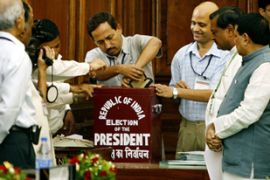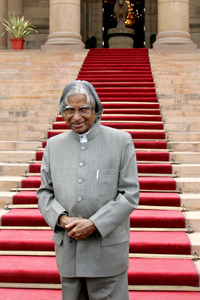India elects first woman president
Pratibha Patil wins comfortably, despite being mired in controversies.

Hundreds of delighted Congress supporters danced in the streets, banging drums and setting off firecrackers outside her home in New Delhi and in her hometown in the state of Maharashtra.
Under the constitution, the prime minister holds the executive reins but the president plays a role in forming governments at state and federal levels, making the post hotly contested.
Elected for a term of five years, the Indian president is the supreme commander of the armed forces. The chiefs of the army, navy and air force report to the president.
The president can also grant pardons or reduce sentences, particularly in cases involving the death penalty.
Thursday’s presidential poll followed campaigning described by analysts as the most vitriolic in India’s six decades of independence.
Gender equality
Patil is from the Congress party and her candidature was seen as a reward for her 45 years of service to the Congress.
Harish Khare, political editor for The Hindu newspaper, said: “She is a Congressman, an old Congressman. She belonged to the old Indira Gandhi loyalist group. One can say that she is an old Congress loyalist.”
|
“They bring out this lady from the back or beyond … and they finally said, well look here, we’ve got a woman as president, regardless Seema Mustafa, political editor for The Asian Age newspaper |
One of the highlights of Patil’s political career has been as the governor of the western Indian state of Rajasthan, where she refused to sign on a bill that would make religious conversions illegal in a state ruled by the opposition Bharatiya Janata Party.
Sonia Gandhi, the president of the ruling Congress party, has said her election would boost the cause of gender equality and would be a “historic moment”, but critics say she has been plucked from political obscurity.
Seema Mustafa, political editor for The Asian Age newspaper, said: “They bring out this lady from the back or beyond, her own party … didn’t know who she was.
“And then they finally said, well look here, we’ve got a woman as president – regardless of the qualifications, regardless of whether she’s done anything for the woman cause.”
Patil has, however, been buffeted by controversy, facing accusations that she protected her brother in a murder probe and shielded her husband in a suicide scandal.
There were also claims of nepotism and involvement in a slew of financial scams.
Patil, a demure figure who dresses conservatively in a sari pulled over her hair, has denied any wrongdoing.
She has also been mocked for revealing that a dead spiritual guru gave her a “divine premonition of greater responsibility”.
The news magazine India Today put her on its front cover with the headline “Embarrassing Choice”.
‘People’s president’
|
|
|
Abdul Kalam is known for his |
Analysts say Patil has a tough act to follow in the form of India’s popular outgoing president, Abdul Kalam. Congress rebuffed his bid for a second five-year term because, analysts say, it wanted a party loyalist.
Khare said: “She will be as different a president as Mr Kalaam was. Mr Kalaam was a novel experience for us, the first man from outside the political class to come to the president house and she is the first lady to come.”
The silver-haired, shaggy-locked missile scientist, who became a national hero after overseeing successful tests in 1998 that turned India into a nuclear power, was dubbed the “People’s President” for his populist style.
Kalam, the son of an illiterate Muslim boatman, is also known for his simple lifestyle, despite occupying an opulent 340-room sandstone palace that housed the viceroy when Britain ruled the subcontinent.
Kalam said this week he will leave the palace where he has lived for the past five years with just “two small suitcases” after his term expires July 24.
A vegetarian teetotaller, Kalam has said he wishes to return to teaching at a university in Tamil Nadu after leaving the post.
He advised his countrymen, in a thinly veiled warning this week, not to “take gifts that come with a purpose and build families with character and a good value system.”
Corruption is rife in Indian politics and bureaucracy and analysts have speculated over whether Patil can resist the pressures of the ruling coalition and act independently.
“The last few presidents have set a very high standard of non-partisan conduct,” said analyst Mahesh Rangarajan. “We will have to wait and watch.”
